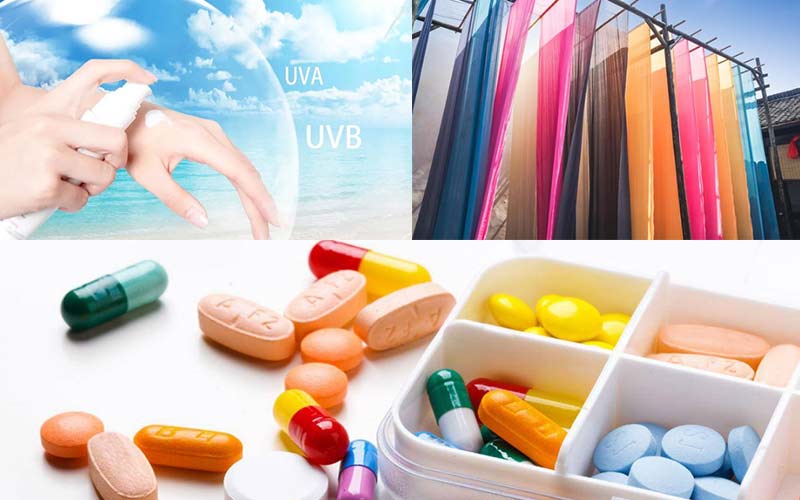Polyvinylpyrrolidone is also called PVP, CAS number is 9003-39-8. At the same time, PVP has excellent solubility, chemical stability, film-forming ability, low toxicity, physiological inertness, water absorption and moisturizing ability, bonding ability, and protective adhesive effect. It can combine with many inorganic and organic compounds as additives, additives, auxiliary materials, etc.
Polyvinylpyrrolidone (PVP) has traditionally been used in various fields such as medicine, cosmetics, food and beverage, brewing, textiles, separation membranes, etc. With the development of new scientific and technological products, PVP has been applied in such high-tech fields as photo curing resins, Optical fiber, laser discs, drag reducing materials, etc. PVP with different purities can be divided into four grades: pharmaceutical grade, daily chemical grade, food grade, and industrial grade.
The main reason why PVP can be used as a co precipitant is that the ligands in PVP molecules can combine with the active hydrogen in insoluble molecules. On the one hand, relatively small molecules become amorphous and enter PVP macromolecules. On the other hand, hydrogen bonding does not change the water solubility of PVP, so the result is that insoluble molecules are dispersed in pVp macromolecules through hydrogen bonding, making them easy to dissolve. There are many types of PVP, How do we choose that model when choosing. When the amount (mass) of PVP is the same, the increase in solubility decreases in the order of PVP K15>PVP K30>PVP K90. This is because the solubilization effect of PVP itself changes in the order of PVP K15>PVP K30>PVP K90. Generally, pVp K 15 is more commonly used.
Application of industrial grade PVP: PVP-K series can be used as film agent, thickener, lubricant and adhesive in daily chemical industry, and can be used for eruption, Moss, hair fixative gel, hair fixative, etc. Adding PVP to hair dyes and modifiers for skin care, foam stabilizers for shampoos, dispersants and affinity agents for wave styling agents, and to cream and sunscreen can enhance the wetting and lubricating effect. Secondly, adding PVP to the detergent has a good anti color effect and can enhance the cleaning ability.
Application of PVP in industrial and high-tech fields: PVP can be used as a surface coating agent, dispersant, thickener, and adhesive in pigments, printing inks, textiles, printing and dyeing, and color picture tubes. PVP can improve the bonding performance of the adhesive to metal, glass, plastic and other materials. In addition, PVP is increasingly widely used in separation membranes, ultrafiltration membranes, microfiltration membranes, nanofiltration membranes, oil exploration, photo curing resins, paints and coatings, Optical fiber, laser discs and other emerging high-tech fields.

Application of medicinal grade PVP: Among the PVP-K series, k30 is one of the synthetic excipients used, mainly for production agents, adhesive agents for granules, sustained-release agents, adjuvants and stabilizers for injections, flow aids, dispersants for liquid formulations and chromophores, stabilizers for enzymes and thermosensitive drugs, co precipitants for difficult to tolerate drugs, extenders for ophthalmic lubricants, and coating film-forming agents.
Polyvinylpyrrolidone and its polymers, as new fine chemical materials, are widely used in medicine, food, daily chemicals, printing and dyeing, pigment coatings, biological materials, water treatment materials and other fields, with broad market application prospects. After years of continuous exploration, we have developed various aggregation products, including the following:
| Product Name | CAS No. |
| Polyvinylpyrrolidone/PVP K12/15/17/25/30/60/90 | 9003-39-8 |
| Polyvinylpyrrolidone cross-linked/PVPP | 25249-54-1 |
| Poly(1-vinylpyrrolidone-co-vinyl acetate)/VA64 | 25086-89-9 |
| Povidone iodine/PVP-I | 25655-41-8 |
| 2-Pyrrolidinone/α-PYR | 616-45-5 |
| N-Ethyl-2-pyrrolidone/NEP | 2687-91-4 |
| 1-Lauryl-2-pyrrolidone/NDP | 2687-96-9 |
| N-Cyclohexyl-2-pyrrolidone/CHP | 6837-24-7 |
| 1-Benzyl-2-pyrrolidinone/NBP | 5291-77-0 |
| 1-Phenyl-2-pyrrolidinone/NPP | 4641-57-0 |
| N-Octyl pyrrolidone/NOP | 2687-94-7 |
In short, the PVP series of products have excellent performance and are widely used as polymer additives in medicine, coatings, pigments, resins, fiber inks, adhesives, detergents, textile printing and dyeing. PVP, as a polymer surfactant, can be used as a dispersant, emulsifier, thickener, leveling agent, viscosity regulator, anti reproduction liquid agent, coagulant, cosolvent, and detergent in different dispersion systems.